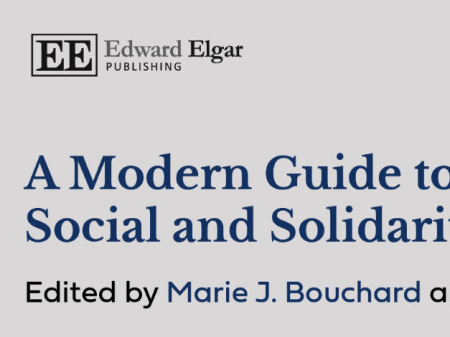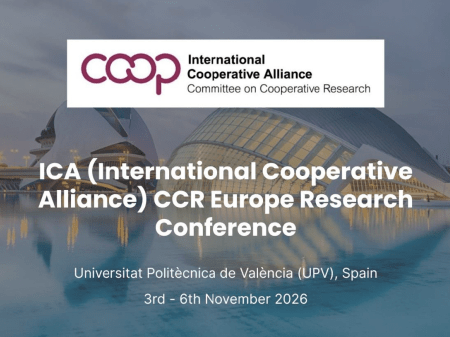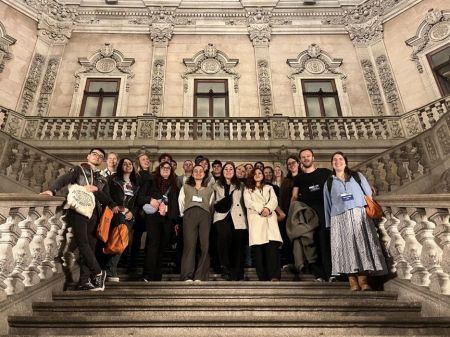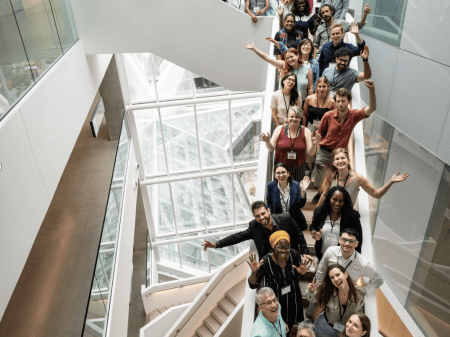We are pleased to share news of a new book relevant to…
[Deadline extended 15 April] Call for abstracts - 3rd International Forum on Cooperative Law, 29-30 November 2021, Seoul, Republic of Korea

Change of Dates and Reopening Call for Abstracts
Important Note
Due to the ongoing COVID-19 pandemic, the 33rd World Cooperative Congress and related events are now rescheduled to take place from 28 November to 3 December 2021.
The preparatory Cooperative Research Conference and the 3rd International Forum on Cooperative Law Forum will take place on 28-30 and 29-30 November 2021, respectively and will be precursors for thematic debates based on scientific and analytical contributions aimed to build content for discussions during the Congress.
The call for abstracts and the call for panel proposals are open again for submissions until April 15, 2021!
We invite you to read this detailed call extension, and request you to direct your questions and concerns regarding the 3rd International Forum on Cooperative Law to lawforum@icaworldcoopcongress.coop
Context of the 33rd ICA World Cooperative Congress
2020 marked 125th anniversary of the International Cooperative Alliance (ICA) and the 25th anniversary of the ICA Statement on the Cooperative Identity. It was also a year spent amid a pandemic that continues in 2021. As a result, the 33rd World Cooperative Congress was rescheduled to be organized in December 2021 in Seoul, Republic of Korea. The decision to further defer the Congress was taken by the ICA Global Board towards the end of 2020 considering the most recent situation of the spread of the COVID-19 virus as well as the progress being made by the scientific and medical communities to protect human life, this year.
The Congress offers a unique opportunity to celebrate and deepen the understanding of the cooperative identity and the profound social and economic impact of cooperatives worldwide with discussions on questions such as:
- How does the cooperative movement transform societies?
- How does the cooperative way of doing business create an innovative pathway to a sustainable future?
- How cooperatives show resilience and innovation, and help communities, in the wake of crises such as the COVID-19 pandemic?
The event will explore how the cooperative identity positively addresses current global issues like climate action, sustainable development, conflicts and violence, income and wealth inequality, gender equality and the future of work. The competitive advantage of the cooperative identity — business performance, market share, best governance and management practices and the unique nature of cooperative capital will also be explored.
A “Call to Action” to be launched in preparation of the Congress will bring together the cooperative movement to discuss commitments to the Sustainable Development Goals that will most directly impact both global stability and human development.
|
What is a World Cooperative Congress? World Cooperative Congresses, organized by the International Cooperative Alliance (ICA), convene only on very special occasions: the creation of the ICA (1st Congress, 1895); the approval of the Statement on the Cooperative Identity (31st Congress, 1995); or the UN International Year of Cooperatives (32nd Congress, 2012). These are gatherings of cooperators at large including representatives of ICA member organizations. The 33rd World Cooperative Congress 2020, initially foreseen for December 2020 and now postponed to 1-3 December 2021, still in Seoul will be only the second Congress to be held outside Europe and is an opportunity to reaffirm the universal value and recognition of the cooperative identity. Read more about the 33rd World Cooperative Congress at www.icaworldcoopcongress.coop |
The 3rd International Forum on Cooperative Law
The 3rd International Forum on Cooperative Law will be organized on 29 and 30 November 2021 in Seoul as a pre-Congress event. The Forum along with the ICA Cooperative Research Conference will be the precursor for debates on key-themes and sub-themes of the World Cooperative Congress, building content for discussions based on scientific and analytical contributions.
Abstracts for papers under this new and re-opened call must be submitted by April 15, 2021. Final papers to be submitted by July 31, 2021.
Those whose abstract was submitted and accepted by the scientific committee in 2020, should send their full paper as early as possible, latest by July 31, 2021.
Background
After the 1st International Forum on Cooperative Law at Montevideo in 2016 and the 2nd such event at Athens in 2018, the 3rd Forum takes place at Seoul, i.e. in yet another region of the ICA, namely in the Asia and Pacific. It is organized by the Ius Cooperativum Association, with the support of the ICA through its Cooperative Law Committee. The theme of this Forum is “The Identity of Cooperatives and the Harmonization of Cooperative Laws. Match or Mismatch?”
Cooperative law is increasingly understood as the translation into legal rules of the cooperative principles as related to the cooperative values and to the definition of cooperatives laid down in the 1995 ICA Statement on the cooperative identity (ICA Statement). Not the least the 2001 United Nations “Guidelines aimed at creating a supportive environment for the development of cooperatives” (Paragraphs 9.-16.) and the International Labour Organization “Promotion of Cooperatives Recommendation, 2002 (n° 193)” (Paragraph 10.(1) et passim), attest to that. While this shared understanding recognizes the role of law as concerns the strengthening and the protection of the cooperative identity and as it confirms the raison d´être of cooperative law as a distinct field of legal science, the potentially counterproductive effects of the harmonization of cooperative laws, which these same international texts support, raises concerns.
Indeed, Paragraph 18 of ILO R. 193 suggests that “[I]nternational cooperation should be facilitated through […] developing, where it is warranted and possible […] common regional and international […] legislation to support cooperatives.” Opinions on the desirability and feasibility of the harmonization of cooperative law are divided, among practitioners and academics alike. Opponents invoke the close link between the idea of cooperatives and cultural givens to conclude that harmonization should not be pursued; proponents of the harmonization tend to refer to the harmonization of other business organization laws to conclude that harmonized law would create the same competitive conditions for cooperatives as it does for other types of enterprises. The former overlooks the fact that a great number of cooperative laws are already harmonized and more are in the process of being harmonized; the latter tends to overlook the problems of harmonization; each side emphasizes a different aspect of cooperatives, namely the associative and the entrepreneurial aspect, respectively. Both sides operate with a rather vague notion of “harmonization”. Both sides hint to an issue in the translation of the cooperative principles into law which is prone to turning the match between identity and harmonization into a mismatch: Principles imply diverse applications, including diverse cooperative laws; harmonized legal rules imply homogenizing abstractions from this diversity. The challenge consists in matching the possible need for harmonization with the need for diverse identities which constitute the identity of cooperatives.
Suggested Topics
The 3rd International Forum on Cooperative Law is to produce insights into how to deal with this challenge and into the question whether the harmonization of cooperative law/s is an obstacle to or a facilitator for the translation of the cooperative principles into legal rules. Particular attention might be given to the impact the current pandemic will (have to) have on (cooperative) law.
Therefore, contributions may deal with either or both of two interrelated sets of questions:
1. Questions concerning the cooperative principles, such as (among others)
- Do cooperatives have a legal obligation to respect the cooperative principles?
- Do cooperatives translate the cooperative principles into rules of their statutes? Research from a legal sociological point of view.
- Considering the legal nature of the ICA Statement and the ILO R. 193, do legislators have to take the cooperative principles into account?
- Considering the legal nature of the ICA Statement and the ILO R. 193, is the difference between the ways they express the cooperative values and principles relevant?
- What is the entry point for the cooperative principles into legal rules? Direct or via legal principles, especially the legal principle of solidarity? Legal principles of the legal order concerned or autonomously developed cooperative legal principles?
- What are the legal effects of the different ways by which the cooperative principles are being translated into legal rules (“simple” reference, inclusion, transcription…)?
- Do legal traditions in the sense of comparative law impact the way the cooperative principles are being translated into legal rules?
- Do different notions of law effect the way the cooperative principles are being translated into legal rules differently?
2. Questions concerning the harmonization of cooperative law/s, such as (among others)
- Clarification of the term “harmonization”. Harmonization, unification or approximation? At which level (national, regional, international)? Harmonization of what (the legal rules, and/or the interpretation of the cooperative principles)?
- Mapping of existing and planned harmonizations. Classification of the way they take the cooperative principles into account. Assessment of their implementation, possibly as compared to the implementation of harmonized law governing other types of enterprises.
- “Pros” and “cons” of the “harmonization”. From the point of view of economics, taking into account overall aims such as sustainable development and new technologies used in the production, distribution and consumption processes; from an organizational point of view where new technologies of telecommunication and blockchain allow for memberships in different jurisdictions and for the organizational integration into value chains across different jurisdictions; from the point of view of socio-psychology (collectives/connectives; individualization/singularization and their impact on solidarity as the kernel of cooperatives).
- Prerequisites for an effective “harmonization” in terms of a harmonized interpretation/ implementation/application. For example, the use of the methodology/methodologies suggested by comparative law for the “harmonization” of laws.
- The byelaw autonomy granted under law as a possible guardian of diversity in the unity of harmonized law/s.
- Harmonized regional and/or international cooperative law as a guarantor of the identity of cooperatives?
- Possible harmonizing effects of the 1966 Human Rights Covenants on cooperative law.
Details for submissions
Participants interested in presenting a paper are kindly invited to send an abstract of a maximum of 300 words in English/French/Spanish/Korean on or before April 15, 2021 to Ifigeneia Douvitsa, Co-founder, Ius Cooperativum, and member ICA Cooperative Law Committee lawforum@icaworldcoopcongress.coop.
Fees and other Modalities of Participation
The 3rd International Forum on Cooperative Law and the ICA Cooperative Research Conference, as pre-Congress events, will be organized in a hybrid format with participants having the option to join virtually through the internet, or physically (presential) in Seoul.
The following fee structure will be applicable for participants and will cover access to all research-based events of the 33rd World Cooperative Congress.
|
Presential (physical) Participation
Virtual Participation
Notes
|
Scientific committee
Chair: David Hiez (Luxembourg)
Members: Apps, Ann (Australia), Cracogna, Dante (Argentina), Fajardo, Gemma (Spain), Kurimoto, Akira (Japan), Meira, Deolinda (Portugal), Münkner, Hans-H. (Germany), Prasad, Bhagwati (India), Tadjudje, Willy (Africa), van der Sangen, Ger (Netherlands), Vladimirova, Oksana (Russian Federation), Park, Kwang Dong; Lee, Donghun; Lim Hyung Taek (Republic of Korea).
Language
Abstracts should be submitted in English, French, Spanish or Korean. Full papers should also be written in one of these four languages.
More information
For more information, please contact us at lawforum@icaworldcoopcongress.coop.




